Arts-in-Service case study
Quintana Roo, September 2007
In trying to build or rebuild any economy the first questions are always about materials and labor and the next is about markets. The immediate market is the tourist trade, furnishings for hotels, villas, beach shacks and restaurants and for the visitors themselves. Visitors shop for things made locally, souvenirs of their holidays, but in many Caribbean resorts, most of the merchandise is imported.
To fill this gap and bring jobs to local people ATA consultants worked across a wide range of skills and materials - from jungle blow-down trees to fine floral embroidery. Funded by JICA (Japan International Cooperation Agency) the program builds artisan enterprises in rural Mayan villages isolated and inland from popular beach resorts like Cancun and Talcum.
Forests and Woodworkers
The Mayans in Quintana Roo villages have the usual rural skills, carpentry for men and sewing & embroidery for the women. Hurricanes in 2004 & 2005 took down hundreds of acres of the low-canopy forest and it seemed to ATA's project leader, Candis Krummel, a textile specialist from Guatemala, and consultant Daniel Mack, artist/designer/rustic woodworker from New York state, that rustic furnishings might be made from the many fallen trees, vines and branches, perhaps with Mayan design influence.
|
|
|
Candis wrote: "As for the hurricane blow-down….this happened in 2005 when Hurricane Wilma sat over the northern end of the Yucatan Peninsula for a few, very long days and nights. It wasn’t the strength of the wind but rather the duration, which did so much damage. All of the “tall forest” (trees over 15 M) were blown down….tropical cedars, mahoganies, and “chico zapotes” (source of natural chicle): the rare and precious hardwoods, many of which were already scarce. The lower forest trees were stripped of all of their leaves and most died, leaving nothing but an impenetrable maze of brush, dry fallen trunks and twisted branches. Because the size of the area affected covers miles and miles, and the danger of fire in these miles of dry, dead trees is so high, most activity in the area is prohibited. This includes anything more than a man working with an axe.
"Even the usual clearing of forest and planting of corn is forbidden by the government. This means that in addition to the loss of their crops plus their forests as a timber reserve and habitat for spider and howler monkeys and the other large animals which would prey on them, they have also lost their ancient seed stocks…a most precious collection of not only corn but other types of beans, squash and more, which were traditionally planted in clearings (“milpas”) in the forests."
Daniel Mack started in the village of Nuevo Durango because it already has an eco- and cultural tourism program and a small bodega/museum that could offer woodland crafts, small chairs and tables, roots carved to bring out animal features, nuts, pods, honey. Even simple woodworking requires skill and quality control and salvaged branches are much harder to work with than milled lumber. He also taught satiny finishing techniques which are preferred by foreign buyers over the locally popular shiny orange varnish.
 Daniel & Mini Chair Maker |
 Filipa begins Mini Chair 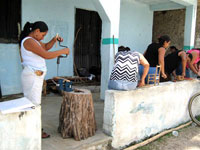 Learning Hand Drill |
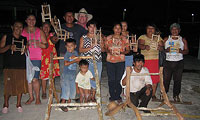 Mini Chair Group 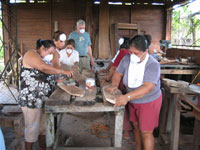 Women Sanding |
Mack recognizes market potential of items from this project are tied to the stories about the people who make them and there was real progress, real prototypes - not styles you'd see at MOMA but more Adirondack-camp transported to the Yucatan Peninsula.
The project is a small one, funded out of Mexico City by JICA, the Japanese International Cooperation Agency Aid agency though IC Net, a Japanese firm, and a local women's organization and budgeted for only one U.S, consultant, Candis Krummel. Daniel Mack volunteered. The local sponsoring organization approves. The Mayan artisans are enthusiastic and hopeful. What now? Will JICA supply on-going funds? Or will this be an isolated moment of hope for the villages? We wait to hear.
In August, 2008, two of the women-woodworkers from Nuevo Durango came to a 5-day workshop Daniel Mack was teaching at The Omega Institute in Rhinebeck, NY. It was their first time ever out of the Yucatan.
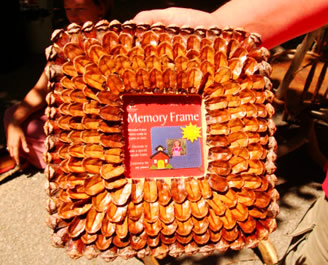 |

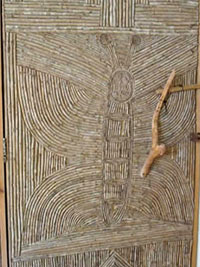
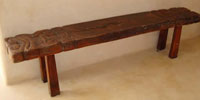
 Block Island
Block Island
 my backyard
my backyard